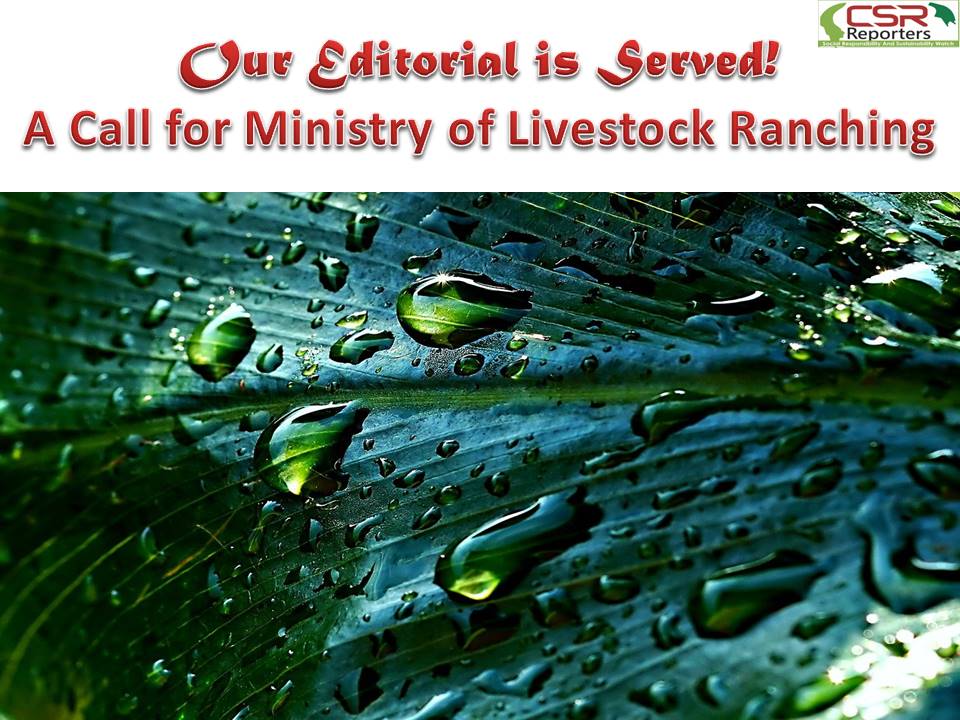
A Call for Ministry of Livestock Ranching
In an age where sustainability and environmental preservation are paramount, the recent actions by the government concerning livestock management require a critical review. The president’s suggestion to create a Ministry of Livestock Development is a commendable step towards addressing the needs of the livestock sector. However, from a sustainability perspective, this move falls short of what is necessary to ensure the long-term health of our environment and the well-being of our communities.
The traditional nomadic lifestyle of cattle grazing is increasingly unsustainable. As we face the growing threats of climate change, it is imperative that we shift towards more environmentally friendly practices, such as ranching. This shift is not just a matter of convenience but a necessity for preserving our planet for future generations.
CSR REPORTERS notes that nomadic grazing has been linked to several environmental issues, including deforestation, soil erosion, and loss of biodiversity. The continuous movement of cattle in search of pasture leads to the overgrazing of land, which depletes vegetation cover and leaves the soil vulnerable to erosion. According to the Food and Agriculture Organization (FAO), overgrazing is one of the primary causes of desertification, affecting approximately 25% of the world’s land surface.
Moreover, the deforestation caused by the expansion of grazing lands contributes significantly to climate change. Trees play a crucial role in absorbing carbon dioxide, and their removal exacerbates the greenhouse effect. Studies have shown that deforestation accounts for about 10% of global greenhouse gas emissions. In Nigeria, where deforestation rates are alarmingly high, the environmental cost of traditional grazing practices is unsustainable.
Therefore, we recommend that ranching presents a viable alternative that aligns with sustainable development goals. By confining livestock to designated areas, ranching minimizes the environmental impact of livestock farming. It allows for better management of grazing resources, reducing the risk of overgrazing and land degradation. Additionally, ranching facilitates the implementation of practices that enhance soil health and increase carbon sequestration, such as rotational grazing and the planting of cover crops.
A study by the World Resources Institute (WRI) highlights that well-managed grazing systems can restore degraded lands, improve water infiltration, and increase biodiversity. Furthermore, ranching can significantly reduce the carbon footprint of livestock farming. Research published in the journal “Nature Sustainability” indicates that sustainable grazing practices could sequester up to 1.3 gigatons of carbon dioxide equivalent per year, contributing substantially to climate change mitigation efforts.
To truly embrace sustainable livestock management, the government should consider creating a Ministry of Livestock Ranching, rather than a Ministry of Livestock Development. This new ministry would focus specifically on promoting ranching practices, providing the necessary support and resources to transition from nomadic grazing to ranching.
The Ministry of Livestock Ranching could oversee several critical areas:
1. Infrastructure Development: Establishing and maintaining ranching facilities, including water supply systems, fencing, and feed storage.
2. Training and Education: Providing training programs for livestock farmers on sustainable ranching practices, animal husbandry, and land management.
3. Research and Innovation: Supporting research on sustainable livestock farming methods, developing new technologies, and promoting best practices.
4. Policy and Regulation: Formulating policies that incentivize sustainable ranching, regulating land use, and ensuring compliance with environmental standards.
5. Community Engagement: Engaging with local communities to raise awareness about the benefits of ranching and encouraging participation in sustainable livestock management initiatives.
The president’s initiative to create a Ministry of Livestock Development is a step in the right direction, but it needs to be reoriented towards sustainable practices. Creating a Ministry of Livestock Ranching would not only address the immediate needs of the livestock sector but also ensure that our environmental goals are met. This approach aligns with global sustainability trends and positions Nigeria as a leader in sustainable livestock management.
CSR Reporters urges the government to take bold steps towards sustainability by adopting ranching as the standard for livestock farming. By doing so, we can protect our environment, improve the livelihoods of livestock farmers, and contribute to the global fight against climate change.
PS: Do you seek guidance on sustainable practices and corporate social responsibility, CSR Reporters offers comprehensive consultancy services to help businesses and organizations implement effective and sustainable CSR initiatives. Please contact us.








